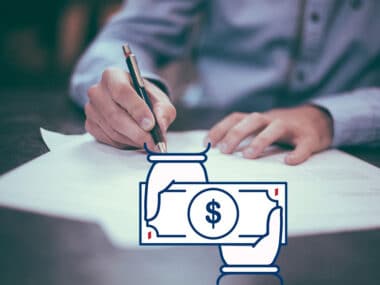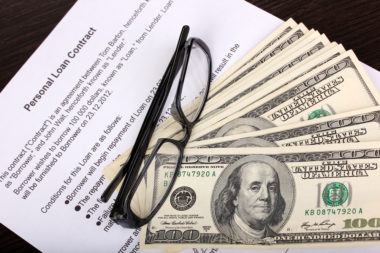Getting a loan with no credit isn’t impossible. A credit score of zero may result in less desirable or limited options, but you should still be able to obtain a personal, car, or home loan. We’ll cover everything, from the basics of how your credit impacts your loan application, to where you can find lenders that specialize in borrowers with no credit.
Table of Contents
Can You Get a Loan With No Credit?
Yes, it is possible to get a loan with no credit. However, it is important to understand that applying for a loan with no credit history at all is tricky. It means the lender is taking a blind leap of faith by letting you borrow. The best way to build credit is through diligence and good financial practices. This results in better interest rates and less overall money you will have to pay.
Getting a Loan With No Credit: What to Expect
When it comes to procuring a loan with no credit, knowing the hurdles you’ll have to overcome can help you better prepare. Below are the different obstacles you may face when applying for a loan of any kind with no credit.
Expect Higher Interest Rates
The first thing you need to know is that you will be facing harsher terms. Typically, loans for people with no credit have higher interest rates. Even if you are working with a lender who specializes in customers with bad or no credit, high interest rates are a pretty standard feature of the loans being offered.
You should also expect to only borrow limited amounts. For example, payday loan companies, which specifically target those who can’t get a bank loan, will only allow loans of up to $1,000.
Provide Proof of Income
Before the lender enters into a loan agreement with you, they will likely require you to show you are gainfully employed, with a steady paycheck. When you have no credit history, your income is the next best indication that you can and will pay back what you borrow.
Proof of income will likely take the form of pay stubs. It may also help to get a letter of recommendation from your employer. This can show lenders that your employer has confidence in you as an employee, and that you won’t be losing your job before paying back the loan.
Offer Collateral or Apply for Secured Loans
It’s important to know the difference between secured and unsecured loans. A secured loan means you are offering collateral, such as your car or home. If you fail to repay the loan, or don’t make payments on time, the lender would have a right to your property in lieu of payment.
On one hand, this is less risky for a lender and makes the loan more attractive for them to approve. On the other hand, if there is any doubt about your ability to make payments on time, it puts your personal property at risk.
In other words, you may need to be prepared to put up something valuable in order to secure the loan. Collateral-backed loans or any other arrangement which involves putting up collateral is just another way of describing a secured loan. More on this later.
Get a Cosigner
A fairly easy way to convince a lender to approve your loan is to find a cosigner. Someone with better credit signs on the loan with you, and should you default on the loan, the cosigner is expected to pay.
Having a cosigner shows that someone else trusts you, and so should the bank or lender. Much like getting a loan from a friend or family member, this could cause a strain on the relationship, should you have trouble paying off your debt down the road.
If you aren’t comfortable with rejection, getting a cosigner may not be the best option, as even close family are likely to prove hesitant in cosigning a loan with you. They are trusting you to always pay in full, on time, or their credit will suffer for actions they didn’t even take themselves.
Despite this, your family members are probably the people who trust you the most, and should still be the first place you look. They probably already know the reasons you need a cosigner, and some may be willing to help you. If your family won’t cosign, try friends. Longtime friends might be willing to put their trust in you to not wreck their own credit score by cosigning with you.
The key to asking someone to be your cosigner is to be open and honest about how you came to be in this situation, and what you are doing to fix it. It may help to have numbers handy, especially what the prospective loan is, what the payments will be, and your income, to prove to a cosigner that you will be able to make payments.
Alternative Loan Options
There are different alternative loan options you may apply for. However, some lenders may be more willing than others to work with those who don’t have a credit score. Read up on your loan options ahead of time so you know which one will best complement your needs.
Some of these alternative loan options may also be suitable for people with low credit scores.
No-Credit-Check Loans
No-credit-check loans are available for those with no or low credit scores, but they are hard to come by. No-credit-check loans with low annual percentage rates (APRs) are even harder to come by.
Loans with no credit checks are typically offered by lenders who are interested in locking borrowers into high-APR contracts with steep default penalties. These could be personal loans, such as peer-to-peer loans, or could be from a lending company. Loans with no credit checks often carry substantially higher interest rates, as is the case with payday loans.
Secured Credit Card
As an alternative to a personal loan, a secured credit card could be another answer to your money woes. Instead of borrowing, you give money to the bank. The bank then gives you the credit card, which acts like a debit card. Using a secured card builds credit, which you can then use to apply for a better loan.
Using a secured credit card means you won’t be getting money in the short term, and will be using money you essentially already had, but it will help you in the long run by improving your credit score if used responsibly. If you aren’t in urgent need of a loan, a secured credit card could help you repair your credit before you apply for a loan.
Just remember that a secured credit card will typically only help with a loan of $300 or less, and you will most likely have to show proof of income to qualify.
Home Equity Loans
A home equity line of credit (HELOC) uses the equity in your house as a limit to how much you can borrow. You can only borrow for a certain period of time, usually between five and 25 years. It’s akin to having a second mortgage.
However, because of the often large limit, a HELOC should be reserved for bigger purchases, such as education or home improvements. Unlike credit cards or loans, the interest rate on a HELOC is variable. You pay off the interest first, and then the principal of the loan. Lenders normally require HELOC applicants to have at least 20% equity in the home. Failure to pay back the loan could result in foreclosure.
Borrowing From Family and Friends
If neither bank nor credit union has terms you can agree to, you may try borrowing from family or friends. Asking a relative is a tricky proposition, however. There may not be interest to pay, but your relationship could be at risk if you don’t pay the loan back.
On the bright side, it’s highly unlikely a member of your family or a friend will ask to see your credit report before agreeing to a loan. Do not mistake this for an informal loan, however. It’s best to draw up a legal agreement, as though this were a loan from someone you did not know personally.
Credit Unions
If a bank won’t give you a loan you can realistically pay back, try a credit union. Credit unions require membership — often based on being in a geographic location, labor union, or having a qualifying employer.
Since credit unions are smaller and cater to a specific part of a community, it’s often easier to get a loan, even with no credit. To them, you are not a faceless number, and they may be willing to overlook, or work with, a lack of credit history. Credit unions are also member-owned. Any loan you get from a credit union is money from your community, which can be a strong incentive for paying it back.
How to Recognize the Risks of Alternative Loan Options
When desperately seeking out a loan, it may be easy to let down your guard and overlook predatory lending. Do your best to understand what predatory lending looks like and learn how to avoid it.
If there are upfront fees or the lender offers a loan without knowing your income, credit score, or other personal information, someone is likely trying to cheat you out of money. You can check a lender’s online reviews or their Better Business Bureau profile to see if they are a legitimate lender.
Here are a few types of loans that can be considered predatory, but are still last-ditch options for those in need:
Title Loans
A title loan is a secured loan that requires you to put up collateral in the form of your vehicle’s title. These types of loans usually have high interest rates, with APRs between 100 and 300% being common.
In other words, by the time you pay off the loan, you will have paid at least twice the loan amount. For example, if you take out a $1,000 car title loan, with 100% interest over a year and with 12 installments, you will pay back $2,000 total by the end of the year. This can create a payment treadmill as you continue getting deeper in the hole trying to pay off the loan. For that reason, title loans are not ideal for borrowers.
Payday Loans
Beware of advance payday loans. While they may not check credit, and they are legal, their interest rates can be sky-high. For example, a typical credit card APR is between 12% and 30%, while an advance payday loan’s APR can be as high as 500%.
It’s important to know your rights — and the lender’s — if you decide to go this route. For example, they must disclose the APR (though they may present it in a different way, such as telling you that you owe $15 for every $100 borrowed instead of saying it’s a 500% APR).
If you default on the payday loan, you can’t be arrested. You can, however, be sued by the company. Failure to show up in court to face said lawsuit could result in a warrant for your arrest. The lawsuit could also end up with your wages garnished to pay back the loan.
Image Source: http://www.picserver.org/





